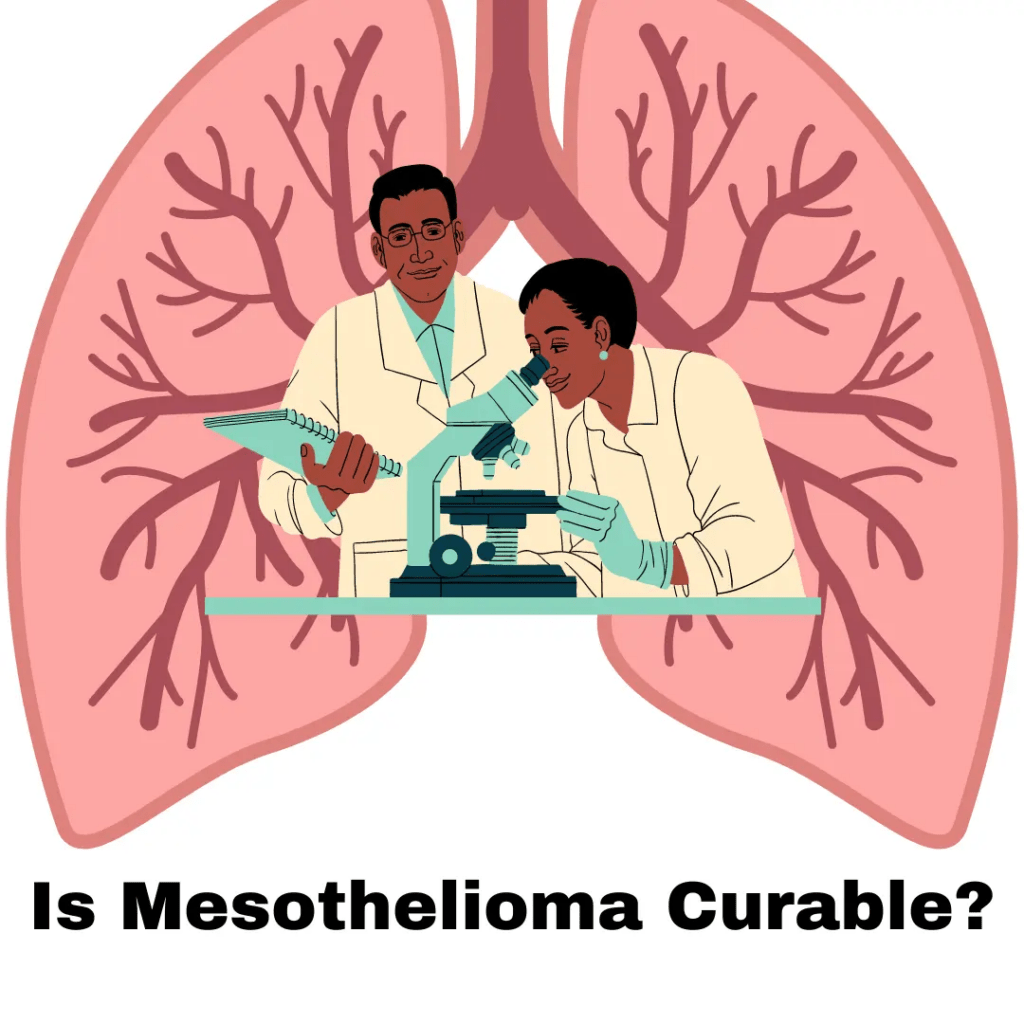Key takeaways: Mesothelioma is an extremely aggressive cancer, given its evasion of diagnosis, long latency period, and association with ingested asbestos. Some treatments for mesothelioma have a “curative intent,” or are intended to eradicate the cancer. Some patients are more responsive to these treatments than others, and end up living for years beyond their expected prognoses. These patients can offer researchers a unique look at the biological environments that are conducive to therapy success, and can shape the future of clinical trials and therapeutic options. So, is mesothelioma curable?
How is Mesothelioma so Aggressive?
Mesothelioma is associated with asbestos exposure. When trapped within the body, asbestos causes a host of problems: chronic inflammation, local anoxic (without oxygen) environments, a compromised immune response, and other significant issues. Because mesothelioma is aggressive in nature, is usually in an advanced stage when diagnosed, and has a long latency period, it’s difficult for doctors to prescribe an effective treatment that targets only mesothelioma cells.
Some treatment plans for mesothelioma are “curative” in nature, meaning that they’re intended to remove or kill all of the cancerous cells. Novel vaccine treatments, which work to lift local environments out of tumor-induced immunosuppression, are “curative.” Surgery is supposed to be “curative.” Chemotherapy is supposed to be “curative.” Oftentimes, these curative therapies are used in conjunction in hopes of a.) physically removing or killing off mesothelioma; b.) taking multiple approaches to killing the cells; and c.) not completely incapacitating the patient while they’re receiving treatment.
Is There any Chance of Mesothelioma Being Cured?
The Environmental Protection Agency’s recent ban on chrysotile asbestos–the last type of asbestos used in the U.S.– is a significant step towards eradicating asbestos-related instances of mesothelioma. However, given the residual asbestos-based infrastructure of buildings, industrial production, and construction sites, we won’t reap these benefits any time soon. Although some vaccines claim to cure mesothelioma, diagnostic models are dependent on a late-stage disease, given mesothelioma’s relative rarity and symptomatic presentation that’s similar to other diseases. So, currently, there is no cure for mesothelioma. Despite this, though, there are existing therapies that aim to cure mesothelioma, and there are clinical trials being employed that are doing the same. Importantly, a mesothelioma diagnosis results in a different prognosis for every patient: some patients live years beyond their prognoses and are in states of remission. Remission refers to the time after a successful cancer treatment, in which there is no detectable cancer. Obviously, patients in remission undergo interval screenings to ensure that the cancer hasn’t returned; if the cancer does return, treatment resumes. Patients in remission offer insight into both the efficacy of different therapies and the different biological factors that might contribute to said efficacy. As a hypothetical–perhaps high iron levels facilitate a certain therapy working better. If a patient receiving these treatments is anemic, doctors could prescribe supplements in order for the therapy to work more effectively.
Could These Answers Change?
A cure for mesothelioma would need to be contextual and patient-specific, and would require a revamping of several phases of the diagnostic-treatment model. For example, diagnosis would need to occur much faster than it currently does–which is when symptoms appear at an advanced stage. Diagnostic models should use occupational screening to estimate levels of asbestos exposure. Ideally, more clinical trials that are immunity-based–which are less intensive than chemotherapy or radiation–will become commonplace treatments. Although mesothelioma isn’t curable, the future of treatment is exceptionally promising.
If you or a loved one has been diagnosed with mesothelioma, please call The Halpern Law Firm at 1 (800)-505-6000. We are here to help you navigate the legal process of filing a claim to receive compensation for your cancer diagnosis. We help mesothelioma victims and their families in Pennsylvania.
https://www.ncbi.nlm.nih.gov/pmc/articles/PMC8302998/
https://www.nature.com/articles/s41379-019-0347-0
Written By Carina Filemyr
Don’t Wait—Contact an Experienced Pennsylvania Mesothelioma Attorney Today!
Now that you know the mesothelioma statute of limitations in Pennsylvania, contact an experienced attorney from our firm to represent your case before time runs out.
At Halpern Law Firm, we help clients throughout Pennsylvania, with offices in Philadelphia, Pittsburgh, Allentown, Scranton and Johnstown. Call us today for a free consultation at (800) 505-6000.

